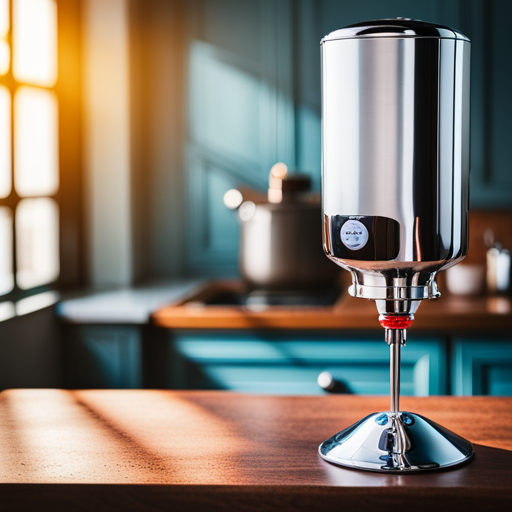Brita Vs Boil: Best Water Purification?
Are you looking for the best way to purify your drinking water? With so many methods out there, it can be tough to decide which one is right for you. Two of the most common ways to purify water are using a Brita filter or boiling it.
In this article, we will compare the pros and cons of each method to help you decide which one is the best for your needs. When it comes to water safety, municipal water supplies are regulated to ensure they meet certain standards. However, using a Brita filter or boiling water can further improve the quality of your drinking water.
Brita filters are designed to remove impurities such as chlorine, lead, and cadmium, while boiling water can kill harmful bacteria and viruses. In this article, we will take a closer look at both methods and help you determine which one is right for you. So, whether you’re looking for a simple and convenient solution to purify your water or you prefer a more traditional approach, we’ve got you covered.
Key Takeaways
– Both Brita filters and boiling water are effective methods of purifying water.
– Boiling water is necessary for water from untreated sources or during a boil water notice.
– Brita filters remove some heavy metals and compounds that affect taste and smell, but do not remove harmful pathogens.
– For most people, Brita filters are a better choice as they are faster and easier to use than boiling water.
Boiling Water Pros and Cons
If you’re looking for an effective way to remove harmful bacteria and viruses from your water, boiling it is a great option. Boiling water kills most microorganisms that can cause illness, making it an excellent method for improving water safety. However, it’s important to note that boiling water won’t remove chemicals or impurities, so it may not be the best option if you’re concerned about these contaminants.
Boiling water has a range of health benefits, but it also has some negative effects on the environment. Boiling water requires energy, which contributes to greenhouse gas emissions and climate change. Additionally, boiling water can release chemicals like lead and mercury from pipes and other materials. These chemicals can contaminate the water and harm both people and the environment.
Despite these drawbacks, boiling water is a simple and effective way to improve water safety. This is especially true if you don’t have access to other purification methods.
Brita Filter Pros and Cons
You may want to consider the advantages and disadvantages of using a filtration system like Brita. One major advantage of using a Brita filter is that it improves the taste and odor of tap water. It removes heavy metals such as mercury, cadmium, copper, and zinc, as well as chlorine and other compounds that affect taste and smell. This means that you can enjoy clean and fresh-tasting water without the need to boil it, which can be time-consuming.
However, it’s important to note that Brita filters need to be replaced after a certain amount of time, which can be a long term cost. Additionally, while Brita filters are an effective way to purify water, they do have an environmental impact. The filters need to be disposed of in a responsible manner, and the production and disposal of filters can contribute to pollution. To help you weigh the pros and cons of using a Brita filter, take a look at this table:
| Pros | Cons |
|---|---|
| Improves taste and odor of tap water | Long term cost of filter replacements |
| Removes heavy metals and compounds that affect taste and smell | Environmental impact |
| Easy to use and faster than boiling water | Does not remove harmful pathogens |
| Can be used in areas with safe tap water | |
| Can save money on bottled water |
Consider these factors when deciding if a Brita filter is the best choice for your water purification needs.
Which Method to Choose?
When choosing a method to purify your drinking water, it’s important to consider the specific contaminants you want to remove and the level of convenience you’re looking for. Both Brita filters and boiling water can produce safe drinking water, but they have different pros and cons that may make one a better choice for you than the other.
In terms of cost effectiveness, Brita filters are generally a better choice. While the initial cost of a filter pitcher or faucet attachment may be higher than the cost of boiling water, the ongoing cost of replacement filters is much lower. Boiling water also requires energy and can increase your electricity or gas bill.
In terms of environmental impact, both methods have some impact, but Brita filters may be a better choice as they produce less waste and require less energy than boiling water.
Ultimately, the choice between Brita filters and boiling water will depend on your specific needs and preferences.
Conclusion
So, which method is the best way to purify your water – Brita filters or boiling water?
The answer ultimately depends on your specific needs and preferences. Boiling water is a reliable and effective method for removing harmful contaminants, but it can be time-consuming and require a heat source.
Brita filters, on the other hand, are convenient and easy to use, but may not be as effective at removing certain contaminants. Ultimately, the choice is yours. Consider your priorities, such as convenience, effectiveness, and cost, and choose the method that best suits your needs.
Regardless of which method you choose, both Brita filters and boiling water can help improve the safety and quality of your drinking water.
